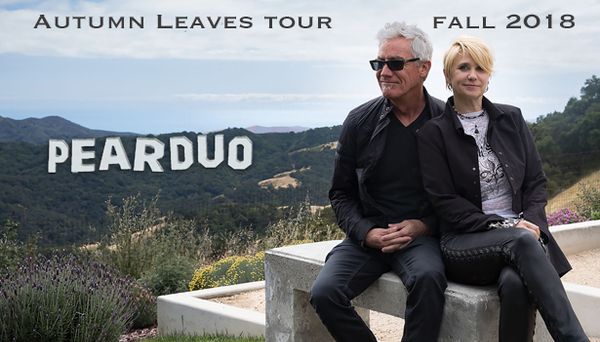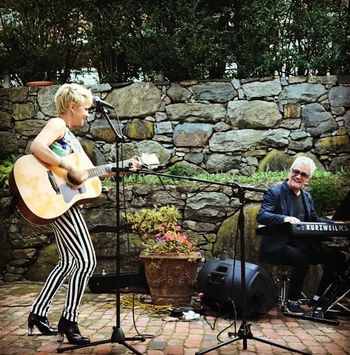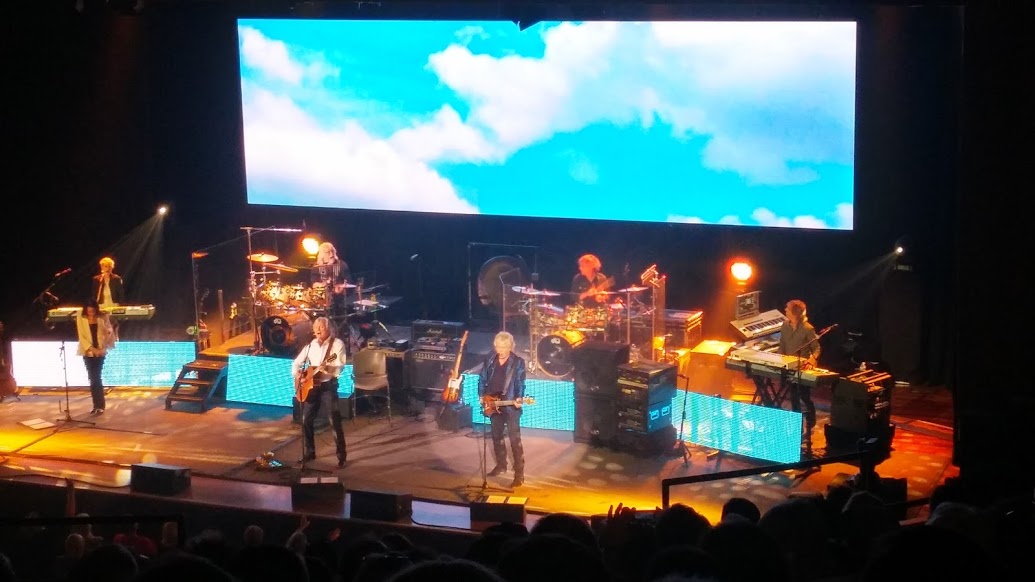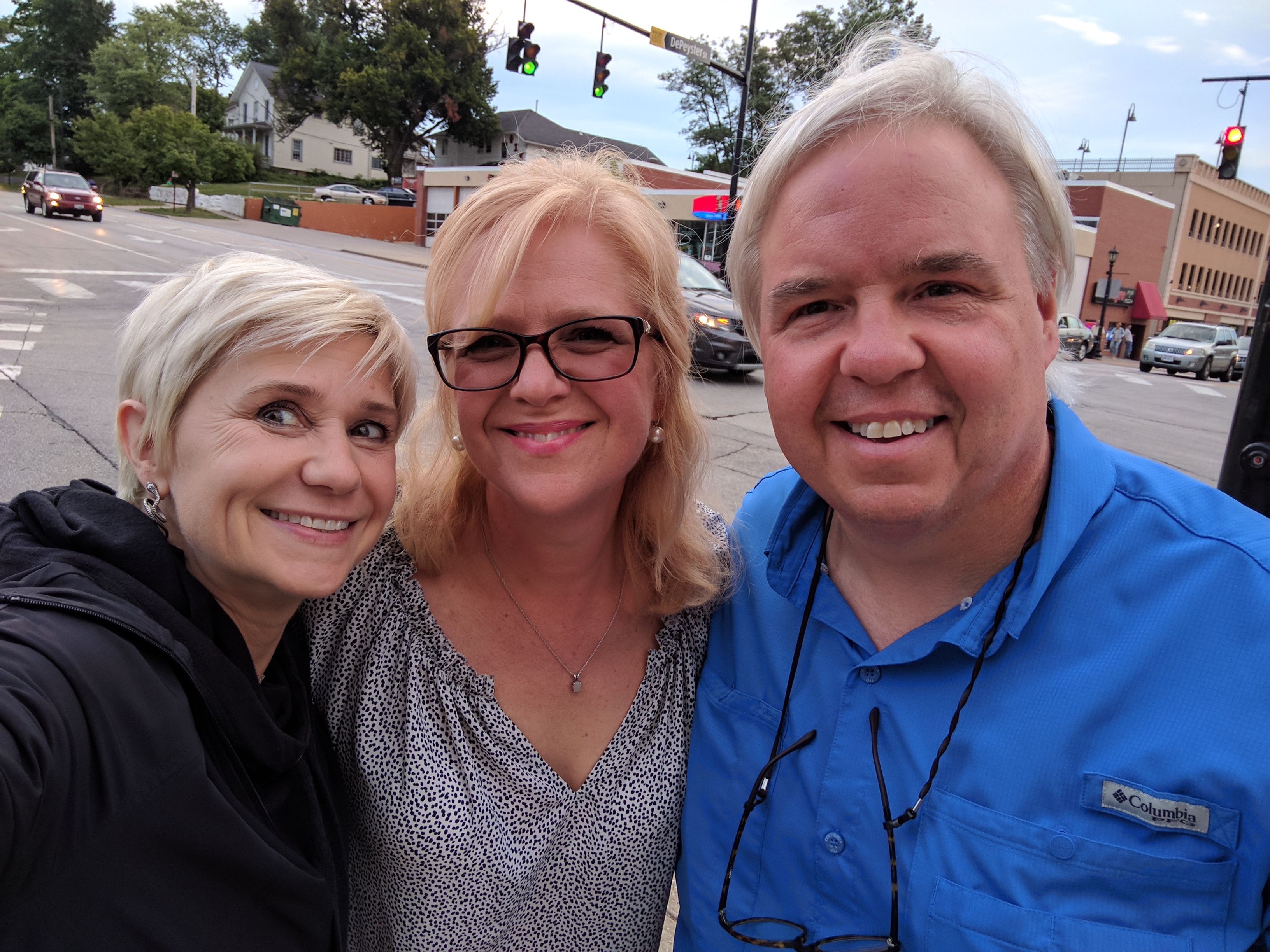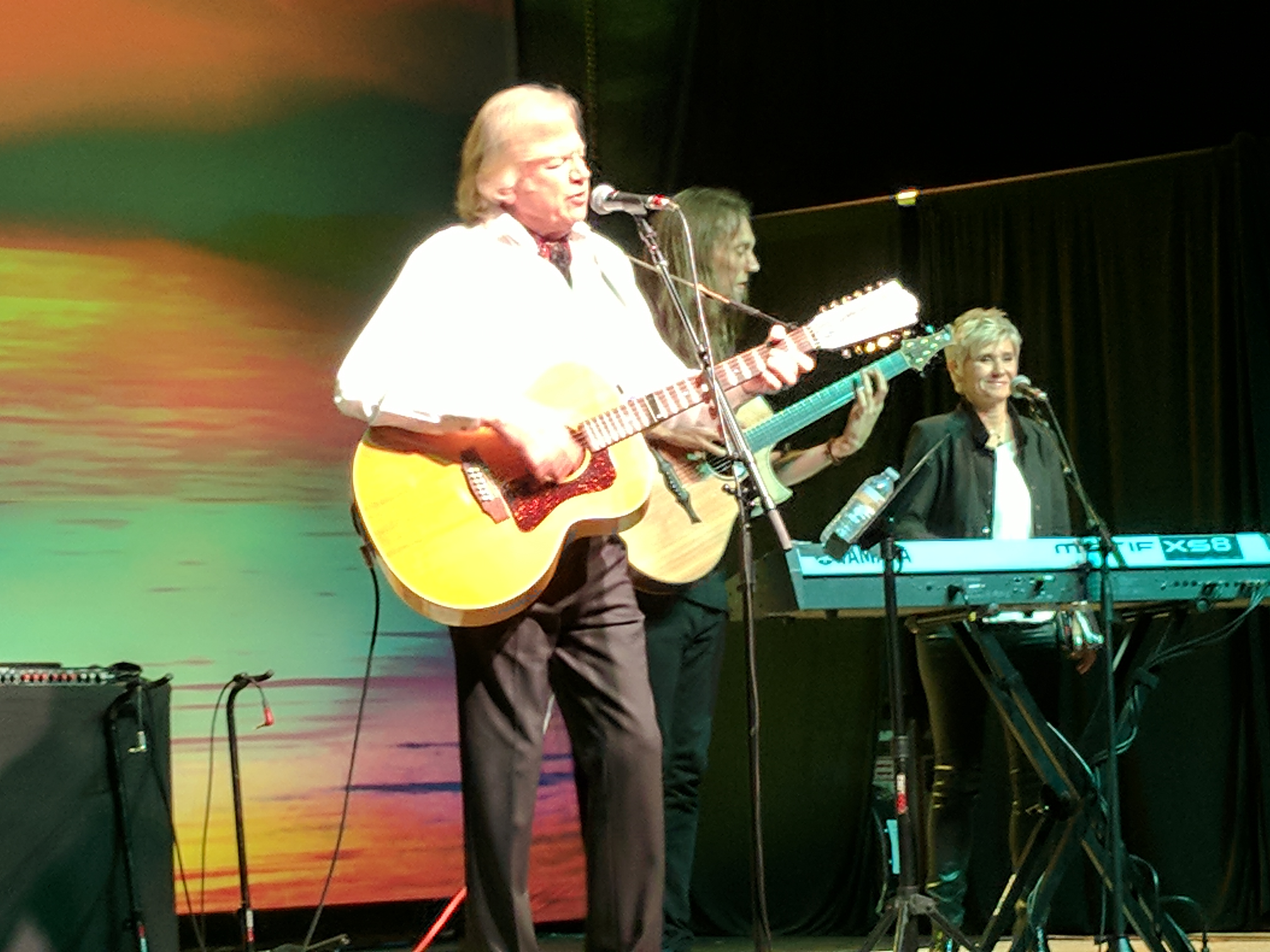Music is a great thing most of the time. We gravitate to it on many occasions. Happy Birthday? There’s a song. Before a ball game? There’s a song. During the ball game? Songs are playing. Holidays? Songs. Going to a dance? You dance to songs. Want to impress the girl? Write her a song. You get the idea.
Julie Ragins and Curtis Brengle are the group Pear Duo. They know a thing or two about music. Obviously they enjoy playing together.
When you write and record music like I do, you have a sense of duty to support other musicians at times. I originally got acquainted with Julie Ragins’ music through The Moody Blues. Yes, that group I have often referenced here and shared with you about. Julie has been on-stage support talent for The Moody Blues for a number of years providing keyboard, backing vocals, and other instrumentation. Julie has the voice of an angel and musical sensibilities that most would be delighted to have a little more of. She is a great addition to any stage she walks on to, no-matter who’s playing on it.
While traveling and playing with Justin Hayward during his solo shows, I had the opportunity to purchase a couple of music CDs Julie made. Her solo effort, 7 Fairway Drive and her Duo CD with Curtis Brengle who happens to be her husband as well. Husband and wife making beautiful music.
When I heard their tunes, I was so inspired by a sound I felt could relate to as well as enjoy listening to. I wrote about my discovery on these pages some time ago. I passed those words, all musicians enjoy hearing good things, to Julie and Curtis and they appreciated it. Those words were reprinted on their website: www.pearduo.com. Over the last few years Julie and I have stayed in touch, thanks to music.
I am delighted to announced here at speaktherights.com that Pear Duo is hitting the road this fall with a unique opportunity they want to share with music students in colleges and universities across the country. Julie and Curtis are going to impart their experience to music students by giving them real-world traveling professional musicians to learn from in a Master Class that will be a difference maker for those in the room. Curtis and Julie will give students the straight talk version of a business that is a tough one to crack but they can also relate to students as to how it can be done.
I am a high school guidance counselor and a former English teacher with a penchant for writing. That is why I do this page. I just write whatever is on my mind because that is what I do. When I heard that Julie and Curtis were presenting these classes, I just thought of all the young musicians that will have the chance of a lifetime to hear from these two. In addition to being gifted musical talent, they are just plain good people. Yes, that helps too.
I would be remiss if I did not disclose my personal hope of one day taking Pear Duo to Al Fresco’s Place Recording Studio to put a tune down with my friend and recording ace, Jeff Carpenter. That is a record that needs to be made.
Curtis and Julie have credentials that are most impressive. Curtis has performed with Ray Charles, Sheena Easton, Barry Manilow, The Pointer Sisters, and Engelbert Humperdinck and many others. Julie has performed with many artists including The Moody Blues, Justin Hayward, Sergio Mendes, Queen Latifa, and The Glenn Miller Orchestra and many others.
Being a fan of The Moody Blues, I have seen Julie perform many times with the group including concerts at two of the most iconic musical venues in the world:
Red Rocks outside of Denver
The Ryman Auditorium in Nashville
On August 24th my dear wife, Carrie, and I caught up with Julie Ragins in Kent, Ohio before she performed that night with Moody Blues’ singer-songwriter-guitar virtuoso Justin Hayward.
Justin Hayward, Mike Dawes, and Julie.
Inspired with the hope to help open a few doors to music programs at colleges and universities, I decided to use that as an excuse to interview Julie!
So, the first interview on speaktherights.com featuring Julie Ragins.
STR: When was that flashing light moment for you that told you that you were going to make a career in music? Was there one?
JR: Nope. No flash. No Moment. In fact, until my early 20’s I really resisted the idea. I was a sax player through college, and all I saw where great musicians struggling to make a living. I didn’t want to spent my life struggling. It wasn’t until the universe took it’s big old boot and kicked me into singing that the idea clicked. After that I planned on pursuing session singing. But once again the universe had other ideas for me. But thru it all I completely feel like I am in exactly the right place. I love how my life has turned out so far.
STR: Where are you originally from and where did you get your musical start?
JR: I was born and raised in Fairbanks, Alaska. I started playing in the school band when I was 9. I took to it right away and at 12 I started playing the piano. My parents were very supportive of it all, and there was a woman in town, Jo Scott, who was hellbent on bringing music and arts to our little town. She single-handedly started the Fairbanks Summer Arts Festival. Between that and the University of Alaska, Fairbanks summer music program I spent a great deal of my summers from age 12 on playing sax. The really funny part about that is everyone had to take choir. I hated it, and frankly skipped it about 90% of the time. I did not think singers were real musicians and I was a musician damnit! I just think that is hilarious!
STR: I get a sense that you can provide a class of music students a tangible opportunity that is rare and probably unfathomable to some educators that something like this really can happen. What are you and Curtis trying to bring to others with your Master Class Presentation?
JR: Being a musician is a very interesting thing. Many musicians and artists don’t get a college education. Those that do learn to play their instrument, but with only a hand full of exceptions, universities do not develop music students to think about HOW they are going to get the job or the gig they dream of. They just teach them how to play the instrument, or sing. The truth of the matter is this…. If you don’t know how to sell yourself you are going to get nowhere. You are a selling product like any other business, but you are selling yourself. Doesn’t matter if you want to be a session singer or the next Beyonce. If you don’t understand some basic ideas about branding, marketing, and social behavior you will never be able to sell yourself. What do you want? Who is your audience? How are you going to get people to pay attention? Nobody ever asked me these questions. I had to figure it out for myself over decades.
30 years ago in Los Angeles there were tons of places to play and there was a great and supportive community of musicians. We looked out for each other, jammed together, shared gig and contacts. Today the scene is small and cutthroat. I don’t feel like this new generation has the support I had coming in as a new player, so they need the information even more.
Today is in some ways harder, and in some ways easier that it was when I started out. Then you could still get “discovered in a smoky bar”. You needed a label, a manager, a booking agent. It was big bucks to record an album, you needed a distributor, and there were A&R reps that developed artists. But you had to get those people to believe in you. Today you can do everything yourself. You can record an album in your garage, distribute it yourself through CD Baby, build your own website, make your own video and post it to YouTube. Social media has forever changed how we consume music. And labels expect you to do it all before they will take you seriously. So you better be a hell of an entrepreneur. You can do it all yourself now which is amazing. But you have to do it all yourself… which can be overwhelming.
STR: You and Curtis have a long list of folks you have collaborated with over the years, how nerve-racking is an audition process and how do you suggest students approach that aspect of the business?
JR: Auditions are an interesting beast. I think the number one mistake people make is not doing enough research and homework going into an audition. Know who you are going to audition for. What sort of music is it? What sort of people have done it in the past. Do you know of anything specific they are looking for? You cannot be too prepared for an audition. But you also need to be yourself. Don’t pretend to be something or someone just to get the gig. You won’t keep it. Be genuine. Be helpful but don’t be a know it all (fine line there). A friend who is a genius at marketing once said to me “Be the solution to someone else problem”. This makes you valuable. And if you have a big audition with someone you are potentially star struck with, keep that stuff locked away tight. Remember they are a person just like you are and they are looking for a colleague, not a fan. Lastly, you learn something every time you do an audition. There is an art to doing it. Take every opportunity you can, audition for anyone who will listen to you, even if you don’t think it is a gig you want. You might be surprised, and if nothing else you just might learn something valuable.
STR: How long have you and Curtis been Pear Duo?
JR: It started about 2 1/2 years ago with the idea to make a CD that I could sell at Justin Hayward’s solo tour shows. After we made the CD, we got the idea to do house concerts, so we did some research, and started reaching out to Moody Blues fans to see if we could get some interest and it worked. We did 30 concerts the first year and this year have added our master class into the equation and hope to double that number.
STR: What was the inspiration for the name of your duo?
JR: It was a simple play on words. That’s it. We were trying to find something simple, that was easy to remember, and something that could be strong visually as well.
STR: What is the largest crowd you have performed for with any group?
JR: Twice in my life I got to play the Hollywood Bowl. I think it holds 18,000. Last year with the Moodies and in the mid 90’s with Sergio Mendes.
STR: I know you have worked with The Moody Blues since 2010 and you also play with Justin Hayward, Moody Blues front-man, during his smaller solo gigs. How are they different? Which do you enjoy more? (I have to ask)
JR: Actually I did my first tour with the Moodies in 2005, subbing for their back ground singer. The end of 2006 I subbed again and stayed on until early 2009. Then I came back in 2010 and have been there ever since.
I cannot say I like one more that the other. They are so very different.
I love the Moodies’ show because it’s a full on rock concert. It’s good fun. About 5 years ago John Lodge asked me to play saxophone on a few of his songs. I had not played in 20 years. It was terrifying and exhilarating. Like being reacquainted with your high school sweetheart. I will be forever grateful to him for bringing that back into my life.
Now Justin’s show is totally different. Much more introspective. Much smaller. Extremely intimate. And since we are only a three piece group everything you do matters. Being the sole keyboard player has stretched me to say the least, but Justin is very gracious and patient with me. And singing with him is truly a joy. Our voices work very well together and I love the challenge of finding that place where I can duck in on a background part and my voice almost disappears into his. You hear the parts but not so much the individual voices. Especially when singing in unison. You cannot do that on a big, loud gig. On smaller stages you can find an emotional connection that is very difficult, if not impossible to find in a large venue. Then again it sure is fun to rock out!
STR: What instruments have you learned and who were your teachers?
JR: I have messed around with a lot over the years. Each instrument taught me something unique. I played sax first. I think my most influential sax teacher was Mike Monaghan. He came to Fairbanks every summer for the arts festival. He is still an active player in Boston and was truly inspirational. When I went to Musicians Institute in 1989 to pursue voice, I found my vocal teacher, Kevyn Lettau. She taught me how to use my instrument. I could not do what I do without her knowledge and guidance. I learned to sing with good technique and to this day I do not lose my voice from singing. I still study with her when I can. Also at MI I met a wonderful teacher who did the ear training and sight singing classes, Dick Hamilton. I studied piano privately with him. He let me join in on a sight singing group he led as well. We are still friends. Over the years I have also learned to play guitar, and have only dabbled here and there with lessons. I also messed around with some bass, and recently took up harmonica for a song in Justin’s solo show.
STR: What did these teachers bring to the process of learning that made things better? Anyone make things worse?
JR: I think the greatest thing a student can experience is the joy and heart a good teacher brings to the table. There is a great quote…. “students don’t care how much you know until they know how much you care.” I have had some dismal music teachers over the years, but the good ones make up for it in spades. I can’t say any of them made things worse. The bad ones just made me search harder for the good ones, and maybe I would not have found them if I wasn’t looking hard enough, so who can say.
STR: Aside from the tangible aspect of professional touring musicians being in the room, what “it factor” will your Master Class bring music students?
JR: The “IT” is to get students THINKING about what they want. We are not here to say “do it this way and you will succeed”. That is impossible. There are so many ways to find success in today’s music world. But if you don’t start asking yourself the right questions you can never find any answers. We ask each person in our master class “WHO ARE YOU AND WHAT DO YOU WANT”. The vast majority cannot answer the question. If I add to it “AND WHY SHOULD I CARE?” pretty much everyone folds. The truth is until you have a compelling answer to these questions you are going to flounder. Your answer could change over time, but you need to start with some sort of a focus. That is what we offer. Tools to help students help themselves.
STR: Having done for so many years in front of so many crowds, do you ever find youself in awe when singing harmony with Justin Hayward on a song like “NIghts n White Satin”? It is your gig too.
JR: My wow moments come from a different place than you might think. With Justin I never think it is my gig because it’s not. Once in a while someone will say to me “I wish I could have heard you better” after a gig. The truth is, it is my job to support Justin, or whoever else I am working for. If I am sticking out I am not doing my job. My wow moments come when I do a good job. When I play well, and when my voice blends perfectly to the point in becomes almost invisible. When the sum is greater that the individual parts. When we all feel it together on stage and the magic happens. Those are my wow moments.
STR: The first song that ever got my attention outside of church music was Billy Swan’s “I Can Help” in 1974 when I was six years old. Things changed so much hearing those sounds and those words. My friend and collaborator Tim Krekel was playing and touring with Billy Swan around that time so that made it even more special later in life for me when I was working with him. Sort of a full circle thing. What song on the radio “grabbed you and took you along” for the first time? Was there one?
JR: Wow, that is hard. I’m not sure I can define any one song in that way. My musical childhood was pretty schitzo. My father loved jazz and was always playing his records in the house. I played jazz sax, and classical piano. Then I was listening to music with my friends starting probably in the late 70’s. Hard rock was big in my circle. The first album I ever bought was AC/DC Back in Black. That blew my mind. I certainly am a product of the 80’s. Justin says it, we will always love the music of our youth. So late 70’s to the early 90’s was hugely influential to me. But one specific song… no.
STR: You are an accomplished recording artist. I am familiar with your work and enjoy it very much. When you record, do you have a full song ready to go or do you improvise as you go along? When I am in the studio recording a song and I am not feeling it, I move on and try to feel better. I don’t know if it is the cost of studio time or the cost of my ego getting beat up (probably both) when I throw up my hands and say “next song!” How do you deal with that?
JR: When I have written, I will finish a song and come into the studio with it ready to go. Production changes and evolves, but I feel like it’s my responsibility to have the writing done so I am not wasting peoples time. For the most part I sing a song, maybe do several takes and then walk away. I usually find the one I like best as a whole and then if there is a line or a work I want to improve I can pull it from another take. Once in a while I will just punch in something I want to improve. If I am really hitting a wall, I may just stop and come back to it later but that is very rare. I usually will just plow through it.
STR: Music brings folks together. Be it in a room, in a concert hall, or a place in the heart. Thankfully my listening to The Moody Blues and Justin Hayward and attending their concerts led me to be acquainted to your music, your songwriting, your counsel (as you have critiqued some of my songs), and I have been able to closely follow your music career. You are married to Curtis Brengle, your Pear Duo partner. Did music play a part in getting you two together?
JR: Sure did! I hired him for a gig! I love playing with him. But he makes me laugh and doesn’t take my shit. I love him and respect him for those qualities. I also admire his musicianship greatly. He is a joy to play with.
STR: How has the Master Class presented by Pear Duo been received so far? Where have you presented it? What notable responses have you gotten back from students yo have met along the way.
JR: We started off doing a general master class on commercial music at Anderson University in South Carolina. We did not really prepare anything. Students started asking us questions, and they were good questions. When we got done we thought, there must be a way we could put together something, a sort of crash course 101 in how to find your way in the music industry. So we started tweaking it, and trying it out at some other places and it began to take shape. Then last winter the director of commercial music at Anderson called us up and said “We have had several big names come in and give master classes in the last school year. When we asked the students who they would like to have come back, hands down they said Pear Duo.” So this fall we will be returning to Anderson to do a week of classes.
STR: You recently moved from Los Angeles to Austin, TX. Is there a good music scene in Austin?
JR: To be more precise, our STUFF recently moved to Austin. We did leave Los Angeles with the intention of relocating to Austin eventually, but this year has been so crazy, and Curtis and I have been so busy that we decided to just be fabulously homeless for at least the rest of this year. We are on the road so much it just did not make sense to rent a place. So far, I love the idea of Austin, but I don’t actually know enough about it. There certainly is a lot of music there, but whether or not it is the right scene for us, we will have to dig deeper and that takes boots on the ground. Maybe next year!
STR: As a songwriter I have been in a situation where a song I wrote meant so much to someone else. They gave me an incredible backstory of the life event that was very serious and difficult to listen to because it was sad and then they told me phrase for phrase how the song made them feel in relation to a tragic event. My reaction was one of bewilderment. I spent an hour writing it and was glad I did. This person thought a great deal more about the song than I ever did and I wrote it. Has anyone ever reacted to one of your songs in a way that opened your eyes?
JR: Hmmmm. I don’t know. I have very little experience sharing my original music with people I don’t know. I made the 7 Fairway Drive CD almost 20 years ago. It’s the only time in my life I have ever written songs. I don’t think of myself as a songwriter really. It was just something I did once a long time ago. My songs are hugely personal. I think it would be very hard for them to mean more to someone else than they do to me. But what a wonderful thing, to be able to touch someone else like that. Music really can bring joy when people need it and if I can do that, I don’t really care if it is one of my original songs or a cover. Joy is joy.
STR: My Moody Blues story is a good one. Thanks to a back ailment I was in a department store after a doctor’s appointment the day I turned fifteen in 1983. In an end-cap bin full of cassette tapes my eye was caught by the Days of Future Passed cover art. I took it home and listened and found a sound to hang on to. I have done so ever since. I was so fortunate to be a senior in high school in the Spring of 1986 and The Moodies’ new song Your Wildest Dreams made me look very smart all of a sudden. There is something to be said, and I have heard Justin Hayward say it, about hanging on to the music of one’s youth. What was the music of your youth? Have you held on to it? (Funny how you got to this before I did in an earlier response!)
JR: I touched on this in a previous question but the short answer is yes. I think we all do. The music of my high school and college years will stay with me forever. Since I did not have an older sibling, I was not introduced to music from maybe the 60’s or early 70’s until adulthood. But 80’s rock will reign supreme with me forever. You cannot escape the impact.
STR: Your song 7 Fairway Drive makes me smile every time I hear it. I wish the world could hear it. Which song of yours would you like to share with others if someone said “Okay, Julie, you got half of a million radio plays in the next three months. Which song will it be?”
JR: Wow. That is hard. I do think 7 Fairway Drive is a contender. Soul Refill I think is a solid choice as well. And Where Do We Go From Here. I wrote that after my father died. It is still hard to perform. Even after 20 years, it is raw to me. We have only done it a few times in our set. That said La La Song holds a very special place in my heart since Curtis and I have made it part of our duo project. If you ask me what the strongest hit is, I think it would be that one. But if you ask me what resonates emotionally with me, Where do We Go From Here and 7 Fairway Dr. are tied I think.
STR: We both know music artists that the world should know about. My friend Tim Krekel comes to mind. He made records called Underground, L & N, and Happy Town that had “it”. Give me your luck to talent ratio when all is said and done in the music business.
JR: After I recorded the 7 Fairway Drive CD I spent the next year trying to promote it and find a label. In 1999/2000 that was what you did. The closest I got was an A&R rep at a major label saying “hey, I like you and I like your stuff. If you were 15 years younger I would give you a record deal”. Man that pissed me off, and frankly knocked the wind out of my sails. I had made something I was really proud of, and the only people who would hear it would be my friends and family. I went on with my life while my little piece of art sunk to the bottom of the ocean like a rock. Years later, and a bit wiser, I realized something. I know so many hugely talented musicians that have CDs sitting in the bottom of the ocean along with mine. I am in extremely good company down there. There are more reasons that you can count why some people “make it” and some don’t. You’re not going to have lasting success without talent. And I don’t believe in luck. I believe in serendipity and hard work. I also believe nothing is an accident. When I truly started to embrace that everything happens for a reason I became much happier in my universe. When I don’t get things I want when I want them I know it’s not the right time. Forge ahead. The right thing will present itself. I made a record that I believed in two decades ago. According to a label exec I was too old then. Now I’m 51 and people are buying that same CD. It’s not luck, its not talent. It’s timing.
STR: Speaking of timing….thank you for your time and your thorough answers. There are surely some music students out there who could learn a great deal from the experience, sensibility, and passion for music that you and Curtis, Pear Duo, can bring to a room. I was glad that my dear wife, Carrie, and I had a chance to visit with you recently before the Kent, Ohio concert and we wish you and Curtis all the best.
Take care and we’ll see you down the road!
JR: My pleasure. It never ceases to amaze me the way music brings people together. People who would not normally connect. Like with you, your wife, and me. We never would have crossed paths if it weren’t for music.
Performing always brings me a great sense of joy and satisfaction. Making other people feel good makes me feel good! And teaching, sharing your knowledge, watching someone else run with it and find success, that is something powerful too. It is a different sort of satisfaction and hugely rewarding.
Thanks so much for having us be a part of your blog, and your life. Best to you both!
Speaking the Julie Ragins interview rights…
Danny Johnson
